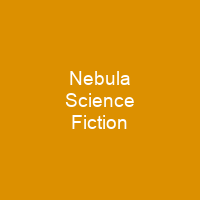Nebula Science Fiction: A Pioneering Journey in British Sci-Fi
Origins and Early Struggles
Peter Hamilton’s Nebula Science Fiction, Scotland’s first science fiction magazine, was born out of a young publisher’s passion. At just 18 years old, Hamilton took on the project with his parents’ printing company, Crownpoint. However, the journey wasn’t smooth sailing from the start. The magazine initially struggled due to sporadic distribution, and it wasn’t until 1955 that Hamilton moved the printing operations to a Dublin-based firm for better efficiency.
A Steady Monthly Schedule
In 1958, Hamilton established a steady monthly schedule, marking a significant milestone. This move not only improved distribution but also helped in building a loyal readership. The magazine’s international circulation was impressive, with strong sales in the UK, Australia, US, and South Africa. Yet, Nebula faced challenges like import controls and excise duties, which eventually led to its closure in June 1959 after issue 41.
A Haven for Writers
Nebula Science Fiction was a beacon of opportunity for writers. Hamilton’s efforts to encourage new talent and offer competitive rates per word made it popular among authors. Notable contributors included Robert Silverberg, Brian Aldiss, and Bob Shaw. The magazine paid 8p or 2.3 cents) per word for well-known authors, which was higher than most UK markets and similar to top US magazines.
Contributors and Artwork
The success of Nebula Science Fiction was not just due to its content but also the talented contributors. Ken Slater, Vin Clarke, and John Brunner helped with production, while Gerard Quinn and James Stark provided cover art. Interior artists like Harry Turner and Arthur Thomson added visual appeal through their illustrations.
A Special Kind of Charisma
Despite facing economic challenges, Nebula Science Fiction became an established part of the British science fiction scene in the 1950s. It was well-liked by writers and created a ‘special kind of charisma’ that many regard as the best-loved British SF magazine.
Legacy and Impact
While Nebula Science Fiction may no longer be in print, its legacy lives on. The stories selected by publisher Peter Hamilton are noted for their wide range of material by excellent writers, though they have become somewhat dated over time. However, Brian Aldiss’s works remain well-known and continue to resonate with fans.
As we reflect on Nebula Science Fiction, it’s clear that this magazine played a crucial role in shaping the British science fiction landscape. Its impact on writers and its contribution to the genre make it a significant chapter in the history of science fiction publishing.
You want to know more about Nebula Science Fiction?
This page is based on the article Nebula Science Fiction published in Wikipedia (retrieved on November 30, 2024) and was automatically summarized using artificial intelligence.








